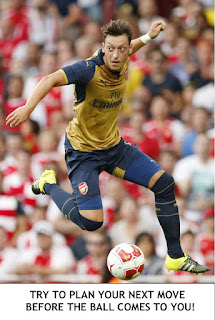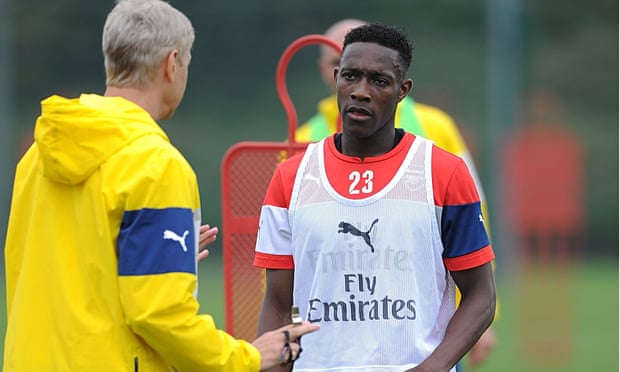"You are the coach. You are responsible for the system and the philosophy."
These were the words of former Dutch international and Ajax legend, Sonny Silooy. Sonny was presenting to us the Ajax philosophy that is admired across the footballing world.
 |
| We also took a tour of the Amsterdam ArenA. |
Sonny himself is a great example of what the club do so well. Players who are entrenched in the Ajax framework, who have been adored at the club in recent history are welcomed back to the club with open arms to help the next generation learn and flourish. Another example is Johnny Heitinga, now coaching with Jong Ajax, the club's under 23 side. His experience in the game and understanding of the club's philosophy is vital. No one is brought back on a whim however, they still have to be the right person for the club and they are paired with a trainer-coach at each age group.
We were fortunate enough to have exclusive access inside De Toekomst, the famous training centre of AFC Ajax. Ajax's record for producing talent is in a league of it's own. 'De Toekomst' translates to 'The future' in English - something held dearly as key at this club. The two days spent at the centre were incredible, hardly enough, but incredible.
For the duration we had the wisdom of Eddie Van Schaick, who has been at the club for nearly ten years as a coach and now consultant, sharing his wonderful wealth of knowledge with us.
Taking and giving responsibility

Responsibility comes from top to bottom. The club strive to improve their model everyday. The coaches have an obligation to those that are selected to play for the club. There is no screaming and hollering at this club - there is a quiet seriousness about the place but what is important is that the players are treated how they should be, as people. The coach must connect with them on all levels, not simply as footballers. Patience is a key quality of a coach at this club throughout the age groups.
The responsibility handed to players here at De Toekomst is in stark contrast to what I have witnessed at English clubs where, without wanting to generalise, players are often handed everything on a plate. The tools are given to the players, but it is what they do with them that is most important. "The most learning happens when a player takes it upon themselves" says Eddie. They are keen to see players putting in the extra work to develop, as that is what makes the difference. Additionally, the players do not need telling to leave the area clear, bring kit, move equipment, collect the footballs in. This shows on the pitch - the players are quick to correct each other, to help each other and make decisions with their own minds.
Planting the seed
Everything done within the academy is so well thought out and to the smallest detail. In their incredible dome facility, there is a performance testing area that analyses an individual's movement. This is done to create an awareness of what you are doing. "Everyone has their own individual technique" and rather than correcting someone, they want them to understand and feel comfortable within their own style.
 |
| 'Power Hill' |
Out on the athletics track, players can take part in a variety of activities. Basketball hoops and mini courts are in place aimed at goalkeepers and attackers so that they can train the mind to be wary of rebounds. 'Power hill' is a steep track and it is easy to think of the old school 'hill runs' when they show us this but work on here is often done with the ball or devised into a game. "They don't even realise it's training". On the small pitch (almost street football like) grids are etched into the markings to promote positional play, a key component in Ajax's philosophy. Here they are encouraged to play 3v1, 4v2 possession games and concentrate on their spacing. The aim is that these things will fast become second nature to the players.
This is much like the practices we witnessed in training at several age groups. Whether it is a technical practice, possession game or small sided game, the conditions are set to replicate Ajax's footballing philosophy and system. Once again, this is so simple yet so effective. A simple attacking (unopposed) technical practice that the under 17s worked on showed the players exactly the type of passes they are looking for and exactly the movements when running into the box.
After watching the Ajax under 23s training, one criticism Eddie had was that in a technical passing practice the first pass in the sequence went wide. He felt that the first pass should go centrally as going wide straight away created a dangerous scenario if possession was lost. Once again, it is the small things but this is what makes them stand out amongst the best.
"They are playing to win within the framework of Ajax"
In Holland, academies play against each other every season in a league system. This, they feel, is important for the players to understand that the aim is always to win. This is always a topic of great debate in England, as we have seen the shift away from league formats until after the age of eleven.
I believe this is a case of culture. In England, there has been a need to come away from the win at all costs mentality that hinders many young players development. In Holland, certainly at Ajax, development takes priority already where they still have a league format. There is no need to take the incentive of winning away.
Eddie states that "The game is for everybody". Once again they reaffirm the obligation to the players they have selected. They all deserve the opportunity, equal playing time is insisted upon. When it comes to international tournaments, this is relaxed slightly but each player still gets significant time on the pitch.
The club has set systems that they are keen for the coaches to use at different age groups. At under 9 for example, in six a side they would like the team to play with one goalkeeper, two defenders, one central midfield and two forwards. At eight a side, which is the next step it is a 1-3-1-3 formation. And at eleven a side, it is the typical 1-4-3-3 that Ajax are associated with.
Fun and T.I.P.S
"Fun is number one".
This will come as no surprise but at De Toekomst fun is a key component of learning. Not only does the most learning come when an individual is having fun, but the playing philosophy of Ajax lends itself to the players' enjoyment. They have the freedom to attack and express themselves. At the younger ages, not a great deal of importance is placed on shape. As they get older, the players are encouraged to push each other and themselves but at the same time they embrace each other as if they are family. Each player has a lot of personality and when we were fortunate enough to witness the
games throughout the age groups, there was a great deal of it on show. Ajax used the famous 'T.I.P.S" model for their development and assessment of players. Technique, Insight, Personality and Speed. If a player has all four in abundance, they are seen as golden. This model does not disregard physical ability but size and maturation is clearly not something that comes into the thinking, a reason I particularly like this model. Focus on what you can control!
Ajax used the famous 'T.I.P.S" model for their development and assessment of players. Technique, Insight, Personality and Speed. If a player has all four in abundance, they are seen as golden. This model does not disregard physical ability but size and maturation is clearly not something that comes into the thinking, a reason I particularly like this model. Focus on what you can control!
In phase one, ages 8-12 players at the academy train four times a week for two hours. When it comes to phase two, however, between 13-16 the length of sessions is reduced to an hour and a half. This is because of puberty, school and other pressures that come with growing up. By the age of twelve, the coaches will know the potential of the players and this is where they need to be patient. It is refreshing to hear about.
Only scratching the surface
This was simply a snapshot of the work that goes on at this world class set up. There is so much more that I could have, and probably should have, added (feel free to ask anything below in the comments). Two days was simply not enough as there was so much more to learn about and further detail to cover. However, I did learn an incredible amount and the experience did leave me with further enthusiasm for improving my own coaching and to visit more clubs. These widened experiences can only be positive and are something I would do again in a heartbeat.
This study visit was made possible by Murray Jones and Euro Football Tours and Events. They have links with many clubs and have covered many different clubs too. I wholeheartedly recommend attending one of their events. You can find out more at: http://www.footballtoursandevents.com/







